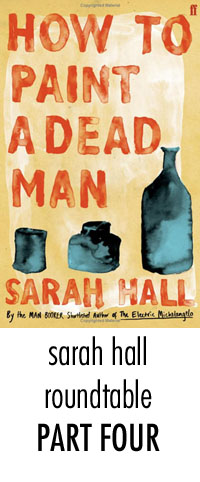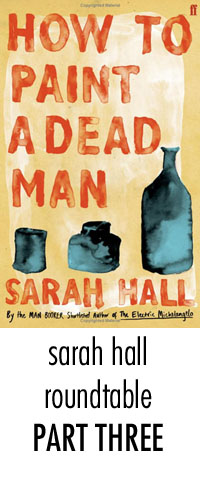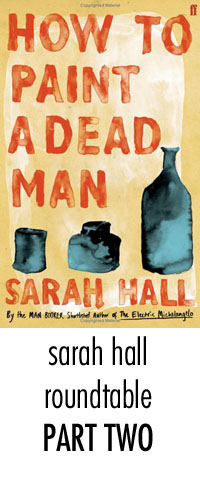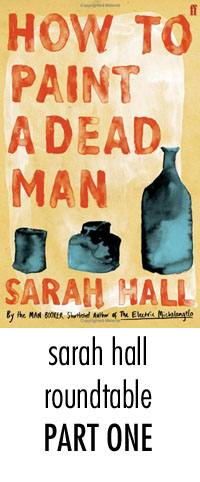(This is the fifth of a five-part roundtable discussion of Sarah Hall’s How to Paint a Dead Man.)
Other Installments: Part One, Part Two, Part Three, Part Four
More on Hall: “The Early Fiction of Sarah Hall” and a one hour radio interview I conducted with Hall in 2008.
Many thanks to all the participants, to Gregory Henry at Harper for getting the books out to everyone so quickly, and to Sarah Hall for her gracious eleventh-hour participation.
Judith Zissman writes:
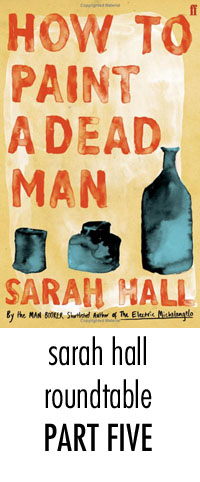 Ed started us out with this, among other things: “This does raise the question of whether this structural tension stacks the deck against the reader.” And I was intrigued to follow that thread through your commentary — many of you commented on the beautiful but chilly still life of words Hall paints here, and her overtly formal techniques.
Ed started us out with this, among other things: “This does raise the question of whether this structural tension stacks the deck against the reader.” And I was intrigued to follow that thread through your commentary — many of you commented on the beautiful but chilly still life of words Hall paints here, and her overtly formal techniques.
I like this kind of effort, and the way that the work itself becomes about representational strategies as much as it is about plot or character or other elements. The book asks the reader to participate in the act of making meaning, much in the same way that visual artists demand the viewer’s collaboration. When I was thinking about curating art to character, I found myself immediately thinking of Cindy Sherman’s work for Susan — the questions of archetype, sexuality, surfaces that thread through Sherman’s work are in part the questions Hall assigns to Susan.
Annette, too, feels archetypal to me – as Kathleen says, the title of her section gives it away (I picture her as The Blind Girl in the famous Millais painting, in that glowing light of divine vision). And knowing that, being handed the playbook for each of those characters up front, all at once as in a painting (as Brian points out), I was still interested in watching those sections unfold. I found them captivating.
I was less captivated by Giorgio, and less still by Peter. In each case, I felt less to explore under the surface than with the women, and I was less interested in their archetypal qualities. I suspect I’d be less interested in their paintings as well (Giorgio seems clearly to be Giorgio Morandi, yes? I couldn’t quite match Peter — did you have any luck with that, Peggy?), and am interested to see the broad split in our roundtable between those of us who thought the Susan sections most successful and those who thought them least
successful.
To me, the Susan sections were successful precisely because they asked so much of the reader: you (yes, you!) must insert yourself in to the work directly or actively resist that insertion – it’s a bold start to the novel and then unrelenting throughout. You are asked to be present for Susan’s wrenching pain, her transgressions and carnality. You’re not allowed to look away.
Peter’s foot stuck in the rock? Not so boldly compelling.
Of Hall’s other work, I’ve only read Daughters of the North, which shares with HtPaDM the strong female archetypes, the gorgeous Cumbrian landscape and the exquisite mastery of language. That work is definitely more plot-driven, but still quite formally experimental. I’m curious to read her other two books, and will do so next.
(Speaking of curiousity, and tangents, I’m amused that on Harper Collins’ web page for HtPaDM, the blurb for “New Books Similar to This One” suggests The Tenth Justice By Brad Meltzer: “Landing a prestigious position as a Supreme Court clerk fresh out of Yale Law, Ben Addison is on the ultra-fast track to success—until he inadvertently shares a classified secret with the wrong listener. And now the anonymous blackmailer who made a killing with Ben’s information is demanding…” Hee.)
Thanks for the invitation to participate. I’ve so enjoyed reading collaboratively with all of you.
Anne Fernald writes:
It’s been alternately moving, exasperating, and impressive to read through all these comments from beginning to end just now. But, as others have said, it has been a lot of fun to read this book along with you & I am grateful to Ed for including me in this experience.
Since I’m such a slow reader and such a terrible procrastinator, I saw these emails coming in, one at a time, over the past two weeks and saw many, many of them expressing frustration and even strong dislike for the book.
This took me by surprise.
I loved this book. And often, I haven’t been thrilled by Ed’s picks, so this was a lovely, welcome read. Sarah Hall is new to me and I am happy to have discovered her.
As Ed mentioned at the start, I’m a Woolf scholar. It’s probably no surprise, then, that what matters to me most is not plot: I don’t care at all if a novel has a plot. I do care about voice, about what Woolf called “tunneling,” that sense that characters have lives that stretch back before their novels. I care about careful sentences. Ed suggested “this book is something of an interesting rupture between the modern novel of consciousness and the postmodern novel of playful structure.” It doesn’t feel like a “rupture” at all to me, so I’ll quibble there, but I do think that this novel benefits from both modern and postmodern novelistic traditions.
Miracle finds this a cold book. To me, it’s a lonely book, but not a cold one. Hall seems to care about her characters: Peter and Susan reflect on their misdeeds in ways that suggest a strong ethical sense without passing judgment on them. She even offers Susan a complicated chance at redemption on the book’s final page. I don’t think a cold book would set Susan in motion, grieving for her dead brother, behaving badly, trying to find her way back toward life and feeling, and give her such a measured bit of hope at the end.
I was really struck by Peggy, Jenny & Traver’s critiques because they were so funny and, in being full of wit and energy, I found them hard to disagree with. When Traver writes that he was put off by “fancy prose clouds of florid fucking” and the “genteel exoticism” of the Italian sections, I see what he means. And Peggy’s incredulous, impatient “ “Italian villa plus cleaning woman, anyone? Eat Pray Paint?” made me laugh out loud. Still, and in spite of the fact that I’m not much for erotic novels, I really loved the sex scenes and the way Hall had Susan use them to grope her way back to feeling. I really loved the description of her lover grabbing her bottom and splitting it like he was sectioning a fruit. Typically embarrassed by such comparisons, I found this one sexy and funny: a great way to revive the cliché about apple and peach bottoms.
I share Jenny’s distaste for writing bad reviews, so I had all the more admiration for the way she eased herself into the distaste. And, again, I guess I can see the stereotyping in the Giorgio chapters, but I didn’t mind it. Nor did I mind the fact that some of what he wrote didn’t really seem like the way a painter would talk about his work. Again, perhaps that comes from being a Woolf scholar, having spent decades thinking about Lily Briscoe and Woolf’s ventriloquizing of a painter: whatever Lily may say that’s odd, Woolf’s sister found it spot on. And she was a painter.
The Giorgio chapters, though, were vivid to me (though not my favorite narrative) because I recognized early on that they must be based on Giorgio Morandi, something the title page note confirms. Though I get to the Met much less often than I would like, my daughter, 6, and I spent a day there last January. We stumbled upon the Morandi show. She had her sketch pad with her and was determined to draw, so I spent a long half hour in the small show. The paintings, grey and tan still lives of bottles, grew on me, as did the sense of this artist as a great painter and a cold, quiet man. Wandering through the galleries while my little girl sketched Morandi’s paintings of bottles was a deeply moving experience for me and Hall got the benefit of some of those very powerful and wonderful feelings as I read her book.
Though the communist teacher admires him, I never thought him a communist: the teacher is always apologetic and firmly aesthetic in the terms of her admiration, always defending him against detractors. Morandi died in 1964, at a time when communism in Europe still had cachet and credibility among the elite. I did a little checking and confirmed my suspicions: Morandi had fascist sympathies, as this Yale Press book seems to explore.
I was fascinated by the narrative of Annette: I love the idea of a girl trying to escape the confines of a Catholic village and I think the added complication of blindness allowed Hall to really explore that difficulty with added intensity.
I loved how seriously the book took Susan’s grief. As Jenny is a fan of books about twins, I enjoy reading about grief. Maybe I think I can inoculate myself against the inevitable. In any case, her descriptions of the unsettling sense of detachment from one’s own body resonated deeply with me. As someone said, for me, too, grief happens in the gut and intense sorrow seems to swaddle me away from life and from color.
But my favorite and the funniest was Peter’s narrative. I love taking this big, funny, lout and trapping him in a rock with only his mind to race as maniacally as all of him usually races. And rich and funny that this painter of rocks is named for the rock, Peter.
I also love the subtle feminism: the way that the shadowy women behind Peter and Giorgio and Annette are given enough of a life for us to know that they suffer, that their lives stink for being interconnected with these jerky men who don’t really sufficiently notice them. Someone else said that the second-person works to ratify women readers. I felt that, throughout the book, Hall really was imagining the suffering of the characters on the margins — male and female — in ways that struck me as feminist. I don’t simply mean empathetic, though that’s a big part of it: I mean deeply conscious of gender roles as they shift over time and the pain that we all suffer (including poor Nathan) from being trapped by cultural expectations.
This is a deeply Woolfian book and I loved it for that. I also found myself thinking fondly back on a much less-known and more middlebrow writer who writes about painting and grief: Sue Gee. I’m a big fan of hers and her Earth and Heaven, about artists at the Slade after WWI and the death of a child, was deeply, deeply moving to me. It shares with Sarah Hall a sense of some kind of complicated connection between art and grief: a refusal to make an easy equation, a refusal to make a choice, but an interest in how art takes from and gives back to life: that parents who are artists miss some of their children’s lives, but that they also have a way of mourning that loss that matters beyond themselves. My former professor and friend Harriet Chessman’s novel about Mary Cassat, Lydia Cassat Reading the Morning Paper, also treats similar themes with beauty.
I’ve already recommended this book to several friends. It gave me a lot to think about. As did our discussion! Thanks, all!
Peggy Nelson writes:



So here are what I thought might be “Peter’s mountains!” I was in Venice to see the Biennale, and saw the paintings there. They are by Daniele Galliano and all are 2009, interestingly enough. The canvases were big enough, about 300 cm wide, so that you’d need your whole arm to paint it, and would need to stand back often to judge the effect of the whole. But why I thought of Peter here was that the brushstrokes were bold and obvious, I think Peter would not be so much about blending things as the big feeling and the big gesture – but also conveyed a sense of geology. He’s someone emotionally involved with nature in all its forms (family, quarry, feelings), and I think he would want to make the connection between a brushstroke that he “just feels,” and the sedimentary layers that are actually there! (Note however, the fish as the priest’s headress/vestments – that’s not a Peter thing, too funny, too symbolic.)
I do like Judith’s suggestion of Cindy Sherman-type work for Susan. Also, I did see something in an Australian art magazine, Art World (issue #12) that made me think of Susan as well, but stupidly I left the issue behind because I was stressing about my bags being too heavy again. Anyway these were wall-sized photographic diptychs, one side of which featured a contemporary person, alone or with a bag, barefoot, devoid of expression, while the other side showed shots of walls and angles in empty malls. It sounds too clever and cold, but the visual impact was good, perhaps because of the lighting, the collection of angles, or the not-quite-expressionless faces, which allowed one to project psychological depth. Actually, now that I’m describing them, it kind of sounds like Hall’s project as well!
Anne, Morandi is a great mapping for Giorgio! (In my mind’s eye I kept thinking Manet’s “Asparagus,” if spears were actually bottles 😉
I had such terrible internet connections while traveling that I felt a bit like Peter in the rock (oh no, just got the religious pun there. arrrrgh), knowing all sorts of interesting things were happening in this discussion, yet unable to participate b/c my connection kept getting dropped. Did anyone else think Peter’s predicament a metaphor for castration? I mean the appendage, his name, the balance with the other characters’ sexuality either acting out or repressed . . . We once had an entire lecture in Contemporary Art Theory about Castration Metaphors in Star Wars. Interestingly, our lecturer had turned his polo collar UP. Not sure he realized . . . Anyway, I thought it was the falsest note of the book to pen Peter in like that. Especially when we have the recent example of that guy who actually did use a penknife to amputate his arm to escape from a canyon (in Utah?), and then wrote really beautifully about the horrifying experience. Find another way to show us the flashbacks, I wanted to insist to Hall.
Miracle, I think your observation about the language of art criticism being the closest thing we have to spiritual philosophy is right on. I’m not even a spiritual person, but I agree that that language holds that place in the culture, no matter how secular one personally is. And thanks to Kathleen, I now have a much greater appreciation of Catholicism as a theme in the book, which I had skimmed over the first time. I do think Annette died, and her Vision is commensurate with the divine images of the martyrs, turning their eyes upward while dying, in pain yet in thrall to a more beautiful picture above. That kind of stuff pretty much drives me absolutely bats (not *another picture of Mary and Jesus looking “abstracted”), but because of that, I missed it as a theme the first time around.
Like Michael I was also reminded of films while reading it, maybe La Terra Trema for Italy fore and aft? And Traver, what do you think: an Austin Powers/Blow Up mashup for Peter’s world?
I have also been thinking about what Kathleen and a few others of us said about a consistent authorial voice, and how for some works, or for some writers, that is not only ok, but desirable: mentioned were Roth, O’Connor, Dick, Woolf, and others. And that made me pause, because I do agree with that. So I reconsidered why I had reacted so strongly against it here, in Hall’s book. It may be because I really wanted action, although in Virginia Woolf I do not mind the serious lack of plot. But it may be that the combination of Hall’s beautiful yet somnolent voice, and her choice of still lives as subject matter, enabled the weakest qualities in each, like partners in a dysfunctional relationship. I am again drawn to her including the Renaissance art manual as a coda, in which the importance of choosing different colors is stressed. I think Hall has the answer to her puzzle-box there, but repressed the insight and abreacted it into this novel instead.
Sarah Hall responds:
First let me say how delighted I am that How To Paint A Dead Man has been part of this roundtable discussion. The reading responses have been fascinating, as have the wonderfully tangential avenues down which the discussion has ranged.
Every human state exists in life, and I guess the book tries to be a life study before it is an art study, which does not accord with some of the things that have been suggested: quite the opposite, in fact. I wanted to reflect states of being and ways of contracting with the world. We all live. We all die. We all love and lose and create and question and make meaning in between. For me, the book absolutely does not say that the meaning – the art – that we struggle to make is meaningless when set beside the life.
The exhibition that Susan curates, and initially disapproves of, about the personal lives and artefacts of artists, explores the desire we seem to have to hold practitioners up against their work, to have them explain the work, and often be commensurate to it. It might be worth me saying that what I think and what Susan thinks is rarely the same thing. It seems troublesome to mix up the work and the worker, which is part of the problem that I thought How to Paint a Dead Man explored. It worries me that an exploration of the problem seems to have been mistaken for the problem itself.
Life has few neat arrangements, answers or conclusions, except the great inevitable conclusion. Perhaps it’s a risk not to provide the reader with the level of consoling solvency much literature has conditioned us to expect. The most externally dramatic character interactions and outcomes, written for the sake of convention or superficially to ‘make something happen’ or ‘develop a character’, would have ill suited this novel; it is more of a speculative book, and my preoccupation was with character interiority and investigation. My own preference as a reader is simply to feel accompanied in my life’s experience by fiction, to feel that a novel is a companionable, resonant thing, a reflection of life’s complexity and opacity, rather than a reassuring guidebook with trite answers, or a theatrical set piece with a neat ending. Such are my reading preferences, and such was this project. This is why, for example, I wasn’t worried about the undermined jeopardy of Peter’s predicament. He survives the mountain ordeal – we know this because his story is set in the early 1990’s and he is alive in Susan’s narrative, which is set in present day London. His story is not really a does-he-doesn’t-he-get-out-of-the-mountain-trap story. The trap is the trap of himself, his life, his history and experiences. Can any of us escape this? How might we reconcile ourselves with our own traps?
At one point during the editing I went through and tried to tie the stories together a little more. But the narratives became too contrived and it seemed like such an insult to the intelligence and connecting skills of the readers that I reverted back to a version featuring independent but cross-resonating stories. The version of the manuscript published is the most successful version of the book, the most ‘true’ to itself and to its original ambitions. I do feel – as did those trusted others with whom I consulted during composition – that there are enough deliberate and straightforward connections in the book. Some are subtle, tucked away, and I hope satisfying to discover or uncover (Tom, Tommaso, hyacinths, erotic suffocation). The main characters do feature in each other’s stories, and the narratives all ask the same questions and explore similar ground: how shall we live? Who am I? What meaning is there in this world?
Annette’s story is essentially a dark folk tale. It still employs a degree of ‘realism’ but there seemed fewer requirements for absolute reality. High-resolution, if and when it is used, is used in Annette’s imaginative realm. Also the world in which Annette operates – she is blind and her experiential development has been arrested by her family – is a world of the senses, and of the mind’s eye. Not only of the mind’s eye, but also of the black hole – of the unspeakable powers beneath our impulse to represent, and make the world. The Bestia is there, only just held in check, in each of the four stories.
The sense of the second-person address being the right expression for Susan was intuitive too. That first line, ‘You aren’t feeling like yourself’, I think wrong-foots the reader but also contains its own strange logic when the reader discovers what’s going on with this character – the displacement of her identity. The second person asks the reader to think about who is speaking (or perhaps thinking) the story, and it also asks who is being spoken to. It is an imperative but it is also inclusive. Susan herself is made more remote through the device in a way, while the reader is implicated. Susan’s story, though it is about personal descent and dislocation, I hope really encompasses those modern anxieties we might have about how to be in the world, how to know and be ourselves, and how, despite ourselves, we might make something lasting. This is why I opened and closed the novel with Susan.
I think I can, with a somewhat European sensibility perhaps, become deeply involved with the ideas and philosophies at play in the work, rather than dishing up straight brazen plots and transparent prose. Critics have felt that I haven’t always succeeded in my work, that I’ve fallen off my own tightrope, and that’s likely true, but I guess I would rather try to be ambitious than not – isn’t that what we’re supposed to do?
The book is not really trying to be like a painting, or to use language to evoke, echo, or embody visual art. I would caution against imposing a particular art historical or practical art theory, frame or critique on the author’s motivations and operations – there simply is not one at work in the text. It’s always odd and quite difficult to talk of the influences and scaffolding surrounding a novel. I am not so conscious of them. The novel is a world in itself, grown by its own inner insistences. The drafting and editing choices or instincts occur in accordance with that world’s habitat. Once a novel is completed those interior pathways, every one of which I felt I had fully explored at the time, seem terribly overgrown. Please forgive my inability to be more articulate, more revealing, or perhaps even more curious, about my own creative and constructive process. As I see it my duty is to articulacy in the work, in the fiction. I have no rigid academic take on my literary interests and motivations, creative imperatives or systems. Nor are the books academic fictions. The reader is free, and most warmly invited, to interpret the ideas, meanings, and structures of this book using whatever tools, theories, experiences, emotions, and intellectual faculties they possess and prefer to use.
The novel’s language was a natural and fluent expression for me, a way to tell the stories, a way to evoke and extrapolate. First drafts look very similar to later drafts as far as sentences, descriptive images, and metaphors go, though there are of course cuts, additions and refinements along the way. I’ve never viewed richer language or poetry as a barrier between the book and a reader –- any reader. I don’t consider this work to be exclusive. Literature can be rich and layered. It can also be plain and one-dimensional. It’s up to a reader to decide which kind they want in their diet, and there’s no telling who wants what.
In the end I think literary fiction is, and must be, divisive, because it is particular, often has identifiable stylistic DNA, takes risks, issues challenges, isn’t always comfortable, doesn’t always pitch an easy entertainment, and is imperfect. I know, fundamentally, that this book is, that all my books are, not to everyone’s taste. How To Paint A Dead Man won’t work for everyone. What else can I say? If it’s too cold, read it by the fire. If it’s too hot, put some ice on your neck. But thank you, sincerely, for reading it.
